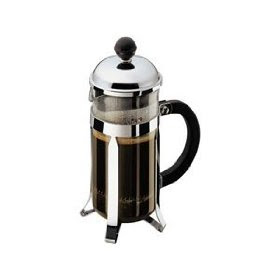

Sometimes assigning the trademark isn’t enough. In the 1950’s, Société des Anciens Etablissements Martin S.A. (“Martin”) owned the design patents for and distributed the “Chambord” and “Melior” French press coffeemakers. In 1983, Viel Castel, a majority shareholder of Martin, and Jrgen Jepsen Bodum established Bodum, Inc. (“Bodum”). Bodum had the distribution rights to the Chambord pot for the United States. Viel Castel was also the owner of Household Articles Limited, which distributed a coffee pot in the Chambord design under the name La Cafetière in the United Kingdom, with a limited presence in Australia and, as alleged by Castel, also in the United States.
Bodum eventually bought out Martin. After several rounds of drafts, the stock purchase agreement ultimately said:
In consideration of the compensation paid to Stockholder [i.e., Castel] for the stocks of [Martin,] Stockholder guarantees . . . that he shall not–for a period of four (4) years–be engaged directly or indirectly in any commercial business related to the manufacturing or distributing of [Martin’s] products . . .
Notwithstanding Article 4 [Bodum] agrees that Stockholder through Household . . . can manufacture and distribute any products similar to [Martin’s] products outside of France. It is expressly understood that Household [ ] is not entitled, indirectly or indirectly to any such activity in France, and that Household [ ] furthermore is not entitled, directly or indirectly, globally to manufacture and/or distribute coffee-pots under the trade marks and/or brand names of “Melior” and “Chambord” held by [Martin]. Stockholder agrees that Household [ ] is not entitled to use for a period of four (4) years the importers, distributors, and agents which [Martin] uses and/or has used in the last year. Any violations of these obligations will constitute a breach of Stockholder’s obligations according to Article 4.
The La Cafetière pots were sold in the United States and Bodum sued for trade dress infringement. Bodum argued that the the agreement only allowed the sale of similar products, not identical products.
Construing the agreement under French law, which emphasizes intent over text, the court found that Bodum was aware that Household was selling the same pot in the United Kingdom and Australia. The only restrictions, however, in the agreement related to the geographic territory and the use of the trademarks “Chambord” and “Melior,” none for the appearance of the pots. Household can sell the same pot.
Bodum “Chambord” pot for sale here. Household “La Cafetière” pot here.
© 2009 Pamela Chestek
